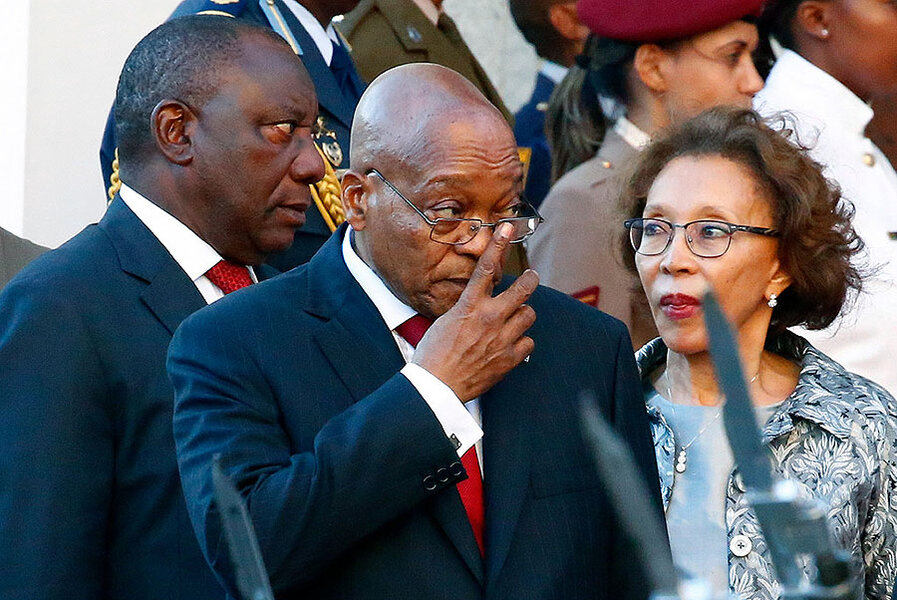Pulling out of ICC would be unconstitutional, South African court rules
Loading...
South Africa was poised to leave the International Criminal Court in October, making it the first state to withdraw from the human rights tribunal. But legal proceedings within South Africa are impeding that effort.
On Wednesday, a South African court ruled that the government cannot pull South Africa from the ICC without parliamentary consent. Siding with the opposition Democratic Alliance party, High Court Judge Phineas Mojapelo told the government that its withdrawal notice was “unconstitutional and invalid” without that consent, and ordered it to be torn up.
"What is so pressing for the national executive about the withdrawal ... which cannot wait for our legislative processes to take their course?" he asked in his ruling.
It’s unclear how much of a long-term difference this decision will make, as it may only delay South Africa’s inevitable departure from the court. But it could come as a blow to President Jacob Zuma’s beleaguered government, which has weathered several allegations of corruption.
"This is a victory for the rule of law and indeed for our country's human rights-based foreign policy, which Zuma and his cronies have tried so hard to depart from," the Democratic Alliance said in a statement following the court’s ruling.
South Africa’s original decision to withdraw followed controversy over a visit by Sudanese president Omar al-Bashir to South Africa. Mr. Bashir is wanted by the ICC for alleged war crimes, crimes against humanity, and the Darfur genocide, and member states have an obligation to carry out such arrests. But that requirement is at odds with South African diplomatic immunity laws, and the government allowed Bashir to attend an African Union meeting there. A local court demanded that law enforcement apprehend Bashir on behalf of the ICC, but he was nevertheless allowed to leave the country.
The incident fueled tensions between the ICC and South Africa, which said having to make arrests for the ICC would prevent the government from acting as a regional peacemaker.
In October 2016, the South African government decided to withdraw from the court, a move that spurred other states – including Burundi and Russia – to say they would leave, as well. Gambia notified the court of its intent to withdraw, but recently retracted that notice under new president Adama Barrow. Philippine President Rodrigo Duterte has also suggested his country could leave the court.
If states leave the court when they come into conflict with the ICC or the ICC opens an investigation on their governments, it will “seriously undermine the legitimacy of the Court,” wrote Alex Whiting, a professor at Harvard Law School who formerly worked in the office of the prosecutor at the ICC, in a November email to The Christian Science Monitor, following Russia’s announcement that it planned to withdraw.
The spate of withdrawals led many observers to suggest that the ICC would have to change its approach in order to maintain relevance. The ICC needs to continue to make judgments in order to prove that it still works, Professor Whiting explained, but they don’t necessarily have to be big cases, such as those against heads of state.
“The Court may have to do smaller cases, or cases that are innovative, like the prosecution of Ahmad Al-Mahdi in Mali for the destruction of religious and cultural property in Mali,” he wrote.
The effect of the new ruling is still unclear. Mr. Zuma’s party, the African National Congress, had previously indicated that a withdrawal bill would go to parliament, where the ANC holds a majority, meaning it would likely be approved. Justice Minister Michael Masutha said the government would press ahead, Reuters reported, suggesting this is nothing more than a temporary delay on South Africa’s way out of the ICC.
But politics may intervene. If the court ruling requires the government to vote and then reinitiate the one-year withdrawal process, it would make ICC withdrawal a question on the political agenda in the country's 2019 presidential election.
Withdrawal is a contentious question: African governments have accused the court of a neo-liberal agenda, noting that most of its cases have been based in Africa. If the question risks becoming a distraction to the election campaign, the ANC may choose to shelve the issue until after 2019.
For now, however, South Africa’s opposition party is taking the high court’s ruling as a sign that the country is still concerned about human rights and due process. Former President Nelson Mandela had advocated for creating the court, whose first judges were sworn in in 2003.
"South Africa does not want to be lumped together with pariah states who have no respect for human rights," the Democratic Alliance said in a statement on Wednesday.
This report contains material from the Associated Press and Reuters.






